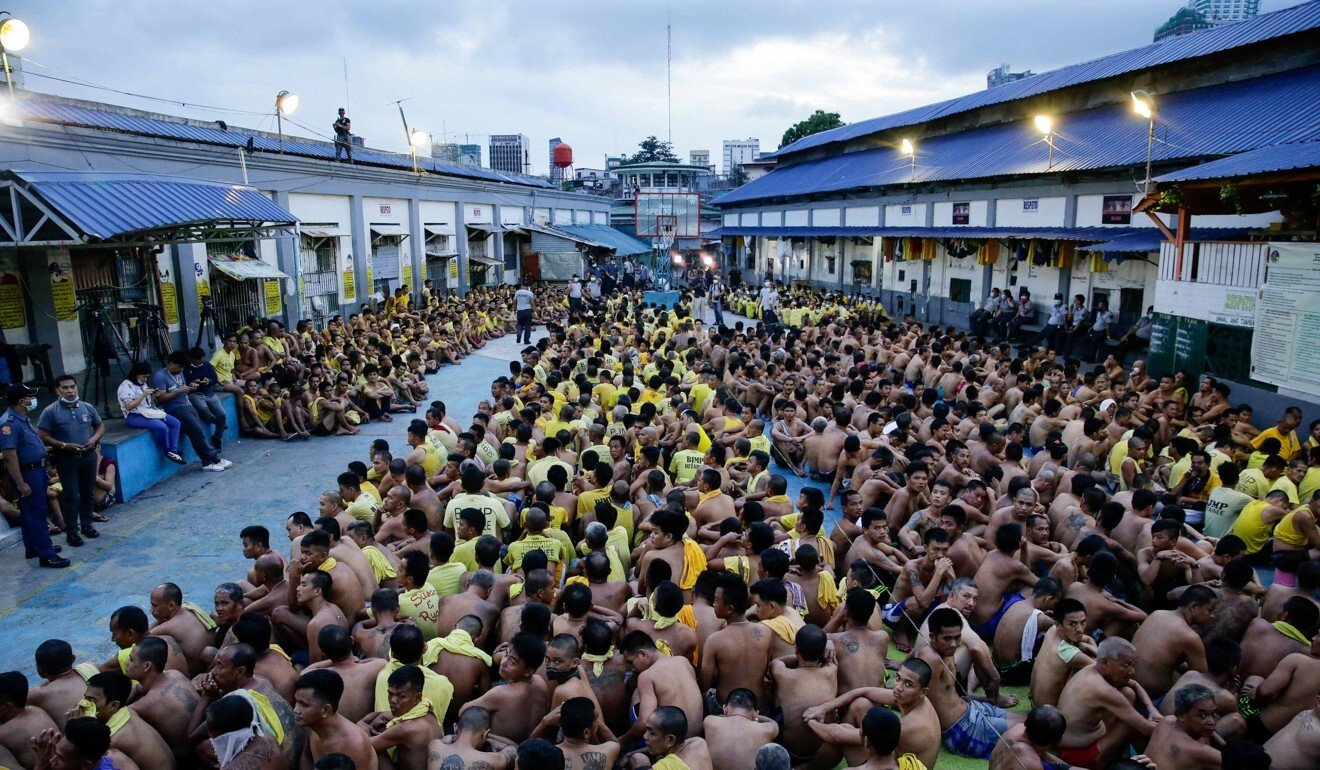
Chinese inmates in Philippines fear the worst as coronavirus deaths rise
- Prisoners suspected to have contracted the coronavirus are dying in the country’s most notorious jail
- Officials of the overcrowded New Bilibid Prison took more than a week to inform some inmates they had likely tested positive for Covid-19, a source says
In the New Bilibid Prison (NBP)’s Building 14 alone, at least five Chinese prisoners died last month, said the person, who knows one of the dead inmates and other prison insiders. The building is where the most high-profile criminals are locked up.
Many Chinese prisoners in the national penitentiary are now worried they could be the next to die, the source said, as the overcrowding and poor hygiene there made it easy for the deadly Covid-19 disease to spread.
“They’re very worried they’ll be the next to go,” the person said. “It’s not safe there.”
Last week, the Philippine government said about 222 inmates in the country had tested positive for the coronavirus, while 10 had died and 31 had recovered. The NBP recorded the most number of infections, with 140 cases.
But the actual number of infections could be higher, human rights groups said, as prison authorities have failed to ascertain the cause of death for many inmates who died in prisons.

01:42
Coffins and skulls warn people in the Philippines to stay home amid coronavirus pandemic
The groups also urged the government to address overcrowding and improve the cleaning of prison cells.
The NBP was built for a prison population of about 6,400, but it houses some 28,000 inmates – more than four times the maximum capacity.
Earlier this week, ABS-CBN cited unidentified documents to report that 136 NBP prisoners died last month, many with unclear causes, more than double the 62 deaths in April. It remains unclear how many of these dead prisoners died of the coronavirus.
Gabriel Chaclag, a Bureau of Corrections spokesman, admitted to the broadcaster that many of the inmates died of undetermined causes, but stressed that postmortem tests would be conducted.
At NBP’s infamous Building 14, the source interviewed said all of the around 70 prisoners locked up there had been tested three times for Covid-19 since last month.
Asia’s next virus flashpoint? Overcrowded, neglected prisons
After the first test in early May, prison authorities took about 10 days to tell five Chinese and six Filipino prisoners they were suspected to be infected. All 11 of them were then sent to the isolation facilities.
Five of the Chinese inmates had since died, including the source’s friend.
The jail authorities told some family members that their relatives had died of heart problems, not Covid-19, the source said. The authorities were not going to allow the family members to retrieve the dead bodies for now.
The source’s friend exercised regularly and was healthy before his death.
“His death was shocking to me,” said the source, who also wondered why it took prison officials so long to inform the inmates of their coronavirus test results.

Inmates at Building 14 were tested for the coronavirus for the second time near the end of last month. This time, two Chinese and four Filipinos were suspected to be infected and subsequently sent to the isolation facilities. It remains unclear what happened to them afterwards.
The third tests were conducted earlier this month. The test results remained unclear.
Karen Gomez-Dumpit, the Commissioner at the Commission on Human Rights, called for better transparency in an interview.
“Given the resources available, mass testing should be accessible to vulnerable groups including (prisoners). In the case of the detained population, frontliners must also be tested to guard against the outbreak in prisons, jails, and other detention facilities,” said Gomez-Dumpit of the constitutional human rights organisation.
“The extent to which this has spread is not clear. Transparency on this issue appears wanting,” she said.
From Philippine jails, Chinese drug lords are directing illegal trade
Last month, the Supreme Court ordered the release of nearly 10,000 inmates who had not been convicted yet, in a bid to stem the spread of the coronavirus.
But Kapatid, a group composed of families of prisoners, said the government needed to release more people, especially the elderly, the sick and the pregnant.
“When you have a broken justice system as we do in the Philippines, that translates into a massive prison population,” said spokeswoman Fides Lim. “The silence of prison officials about what’s really going on is deafening but telling – and frightening.”
She described it as “irresponsible” that prison officials had failed to promptly inform the families of prisoners who tested positive for Covid-19 or died.
In one case, she said the wife of a prisoner only found out earlier this month that her husband had died, after she went to the Bureau of Corrections to ask about his health.
Over 100 inmates infected in coronavirus outbreak at jail in Cebu
She said her 71-year-old husband, Vicente Ladlad, was a political prisoner at Camp Bagong Diwa and had been sick for months. They had not met since March.
The Bureau of Corrections and the Chinese embassy in Manila could not be reached for comments.
One person, who was recently briefed about the operations of Philippine prisons by Bureau of Corrections officials, said the authorities sometimes had problems tracing the family members of Covid-19 victims.
The person, who asked not to be named, said a challenge the NBP faced was that there was a very limited number of health care professionals at the facilities.

